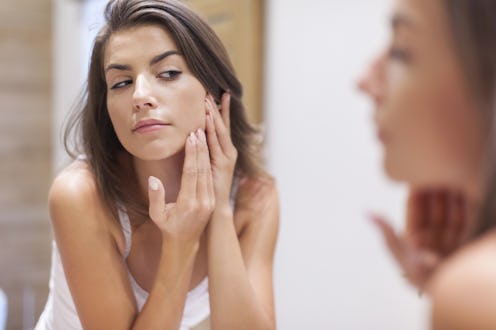Life
6 Signs Your Adult Acne May Indicate A Greater Health Issue

Unfortunately, breakouts aren't just something that happen when you are a teenager. Acne can happen at any age, and it's something you may have to manage your whole life. Although some skin issues are common as you get older, you may want to be aware of some adult acne symptoms that could signify something bigger. If you're constantly getting severe breakouts that seem completely out of your control, it may be a sign of another health issue. Recognizing these red flags can help you get to the bottom of your skin problems and help keep your adult acne at bay once and for all.
"Adult acne can look very similar to teenage acne," dermatologist Dr. Jeremy Fenton of Schweiger Dermatology Group tells Bustle. "In women, most adult acne is related to hormones, and it can start later in life even without a history of teenage acne. Adult female hormonal acne can present different ways in different people, but classically it appears as cystic acne along the jawline that cycles with the menstrual period. Without other signs of an imbalance, this is considered normal female hormonal acne."
In some cases, what appears to be acne may not even be acne at all. And in others, it could indicate an underlying health issue. Here are six signs of adult acne you shouldn't overlook, according to experts.
1It's Accompanied By Other Hormone-Related Symptoms
Adult female acne can be a sign of hormonal imbalance if it comes along with other symptoms such as unwanted hair growth (on the chest, face, or stomach), unexplained hair loss, or irregular menstrual periods. "The most common one is Polycystic Ovarian Syndrome (PCOS)," Dr. Fenton says. "Blood tests performed by your dermatologist or primary care doctor may be able to check for this, but some cases require an endocrinologist for treatment."
2There's A Pimple That Just Doesn't Seem To Go Away
In some less frequent cases, skin cancers can mimic the appearance of acne. "If you have a pimple that has been around for a while and simply will not go away, you should see your dermatologist," dermatologist Dr. Janet Prystowsky tells Bustle. While there is no need to panic, "pimples" that persist for weeks or months are worth getting checked out, and your doctor can help clarify what it may be.
3There Is A Sudden Onset Of Many Pimples
"Sudden, inflammatory acne that is uniform and consists of red bumps or cysts and appears simultaneously over an affected area may be related to an acne breakout from steroid use," dermatologist Dr. Melanie Palm, tells Bustle. This could be from a steroid inhaler or systemic steroids used for a variety of reasons, she says, so ask your doctor if this seems out of the ordinary for you.
4Your Acne Is Different Colors
Acne of different colors may not even be acne at all, which could explain why they don't respond to acne treatments or medications. "Small, hard, white bumps can be Milia, a type of clogged pore," dermatologist Dee Anna Glaser, MD, tells Bustle. "Many blackhead-like lesions clustered on the cheeks and crow’s feet area can be a sign of chronic sun damage." Additionally, yellowish bumps on forehead and cheeks more common in older adults may be oil gland enlargement (sebaceous gland hyperplasia).
5It's Crusting
You should never ignore acne with yellow crusting near the mouth or nose. "This is not acne but instead impetigo, a form of staph infection," Dr. Palm says. "It creates a honey-colored crust, most often around the nostrils or mouth. Removing the crust leads to a weepy underside with redness. Treatment requires topical and sometimes oral medication."
6You Have Deep Cysts
If you have cyclical, deep cystic acne, although not “atypical,” it could require treatment. "This type of adult female hormonal acne often requires a unique approach that may consist of anti-androgen therapy with the prescription medication spironolactone," Dr. Palm says. "Breakouts are deep, cystic, slow to heal, leave post-inflammatory pigmentation or redness, and become worse around a woman’s period."
If you have any of these acne symptoms, consider seeing a dermatologist, who can help get to the root problem of your skin issues — and potentially other health issues.